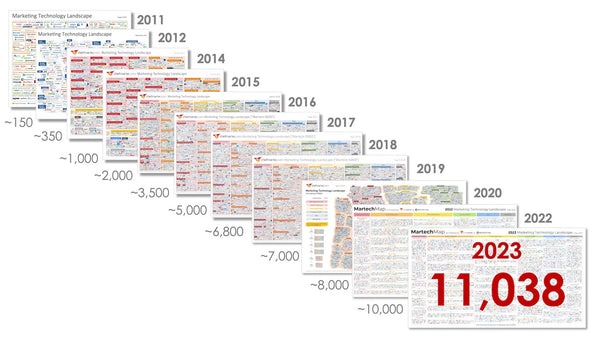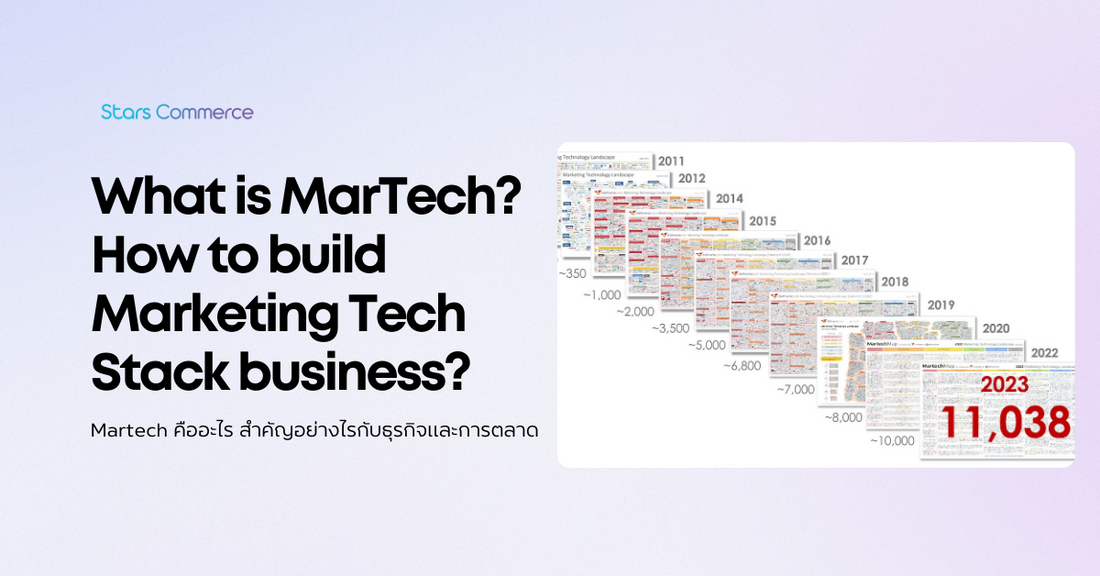What is Marketing Technology (MarTech)?
Marketing technology, or MarTech, is a term used to describe the software and technology used by marketing teams to attract and retain customers. These tools are time-saving, as they typically streamline and automate processes. They also help marketers analyze the success of their efforts.
Marketing technology can be used by any type of marketer — even non-digital marketers. One martech tool is typically used for a different marketing discipline.
In the rapidly evolving landscape of marketing technology, staying updated with the latest trends and strategies is crucial for businesses to stay competitive. This blog combines insights from two industry-leading sources, HubSpot and Iterable, to provide a comprehensive overview of the marketing technology landscape in 2024.

Here are a few examples of disciplines and a martech tool that can be used for them:
-
Search Engine Optimization (SEO): A keyword research tool such as Moz is an example of a martech tool for SEO.
-
Content marketing: A content management platform such as CMS Hub can be used for content creation.
-
Social media marketing: A social management platform such as HootSuite is an example of a martech tool for social media marketing.
-
Search Engine Marketing (SEM): Google Ads is an example of a martech tool for SEM.
-
Advertising: A programmatic ad platform such as mediasmart is an example of a martech tool for advertising.
How is technology used in Marketing?
Technology plays a crucial role in modern marketing, enabling businesses to reach and engage with their target audience more effectively. Here are some key ways technology is used in marketing:
-
Data Analysis and Insights: Marketing technologies such as customer relationship management (CRM) systems, data analytics platforms, and business intelligence tools help marketers gather, analyze, and derive actionable insights from vast amounts of data. This data-driven approach allows businesses to understand customer behavior, preferences, and trends, leading to more informed decision-making and targeted marketing strategies.
-
Automation: Marketing automation tools streamline repetitive tasks such as email marketing, social media posting, lead nurturing, and campaign management. Automation improves efficiency, saves time, and ensures consistent messaging across channels. Automated workflows also enable personalized communication based on customer interactions and behavior.
-
Personalization: Advanced technologies like artificial intelligence (AI) and machine learning (ML) enable marketers to deliver personalized experiences to individual customers. AI-driven algorithms analyze customer data, predict preferences, and recommend tailored content, products, and offers. Personalization enhances customer engagement, loyalty, and conversion rates.
-
Content Creation and Distribution: Content marketing relies on various technology tools for creating, distributing, and managing content across digital channels. Content management systems (CMS), social media management platforms, and content creation tools facilitate the creation of engaging and relevant content for target audiences. Content distribution platforms ensure content reaches the right audience at the right time.
-
Digital Advertising: Technology powers digital advertising platforms such as Google Ads, Facebook Ads, and programmatic advertising networks. These platforms leverage data insights, targeting options, and automated bidding to deliver targeted ads to specific audience segments. Real-time analytics and optimization tools help marketers track ad performance and optimize campaigns for better results.
-
Social Media Engagement: Social media platforms and social listening tools enable brands to engage with customers, monitor conversations, and gather feedback in real time. Social media management tools help schedule posts, analyze engagement metrics, and track social media ROI. Influencer marketing platforms connect brands with influencers to reach broader audiences and build brand awareness.
-
Customer Relationship Management (CRM): CRM systems centralize customer data, interactions, and communications, providing a comprehensive view of each customer's journey. CRM software helps businesses manage leads, track sales opportunities, automate follow-ups, and nurture customer relationships. Integration with marketing automation tools enhances personalized communication and lead nurturing efforts.
- Mobile Marketing: With the proliferation of smartphones and mobile devices, mobile marketing technologies play a vital role in reaching on-the-go consumers. Mobile-optimized websites, mobile apps, SMS marketing, push notifications, and location-based marketing techniques leverage mobile technology to deliver targeted messages and offers to mobile users.
How to build a Marketing Tech Stack?
Building a marketing stack for your business involves selecting and integrating a combination of tools and technologies that work together to support your marketing efforts effectively. Here is a general guide on how to build a marketing stack suitable for all types of businesses:
-
Assess Your Needs and Goals: Begin by identifying your business's specific marketing needs, goals, and target audience. Consider factors such as your industry, budget, growth objectives, and existing infrastructure. Understanding your requirements will guide you in selecting the right tools for your marketing stack.
-
Define Key Components: A typical marketing stack comprises several key components that serve different purposes. These components may include:
- Customer Relationship Management (CRM) System: Manage customer data, track interactions, and streamline communication.
- Content Management System (CMS): Create, publish, and manage digital content across channels.
- Email Marketing Platform: Send targeted email campaigns, automate workflows, and track engagement metrics.
- Social Media Management Tools: Schedule posts, analyze performance, and engage with followers on social platforms.
- Analytics and Reporting Tools: Measure campaign effectiveness, track KPIs, and generate actionable insights.
- Marketing Automation Software: Automate repetitive tasks, segment audiences, and personalize marketing efforts.
- Customer Relationship Management (CRM) System: Manage customer data, track interactions, and streamline communication.
-
Research and Evaluate Tools: Research different tools and solutions available in the market for each component of your marketing stack. Consider factors such as features, scalability, ease of integration, pricing, customer support, and user reviews. Evaluate demo versions or trial periods to assess usability and functionality.
-
Choose Compatible and Scalable Solutions: Select tools that are compatible with each other and can integrate seamlessly to ensure smooth data flow and communication. Choose scalable solutions that can grow with your business and accommodate future needs and technological advancements.
-
Integrate and Customize: Once you've chosen the tools for your marketing stack, focus on integrating them effectively. Implement APIs, plugins, or connectors to enable data synchronization and workflow automation between different tools. Customize settings and configurations to align with your business processes and objectives.
-
Train Your Team: Provide training and support to your marketing team on using the tools within the marketing stack efficiently. Ensure they understand how to leverage the features and functionalities to achieve marketing goals, improve productivity, and deliver results.
-
Monitor Performance and Iterate: Continuously monitor the performance of your marketing stack using analytics and reporting tools. Track key metrics, analyze trends, and gather feedback from users to identify areas for improvement. Iterate and optimize your marketing stack based on data-driven insights and evolving business needs.
- Stay Updated and Adapt: Keep abreast of industry trends, new technologies, and market changes that may impact your marketing stack. Regularly evaluate and update your stack to incorporate innovations, address challenges, and stay competitive in the ever-evolving marketing landscape.
Conclusion:
Building a robust marketing stack for your business is essential for optimizing marketing efforts, driving growth, and achieving business objectives. However, it's important to note that simply making an initial investment in technology without the necessary knowledge and expertise may not yield the desired results. Successful implementation and utilization of marketing technology (Martech) require strategic planning, continuous learning, and alignment with business goals.
At Stars Commerce, we understand the significance of leveraging Martech effectively to fuel business growth. Our expertise in selecting, integrating, and optimizing marketing tools tailored to your specific needs ensures that your marketing stack is aligned with your objectives and delivers tangible results. By partnering with us, businesses can unlock the full potential of Martech, drive innovation, enhance customer experiences, and stay ahead in today's competitive landscape.
Let Stars Commerce be your trusted partner in navigating the complexities of Martech and unlocking new opportunities for success. Together, we can harness the power of technology to propel your business forward and achieve remarkable growth.




